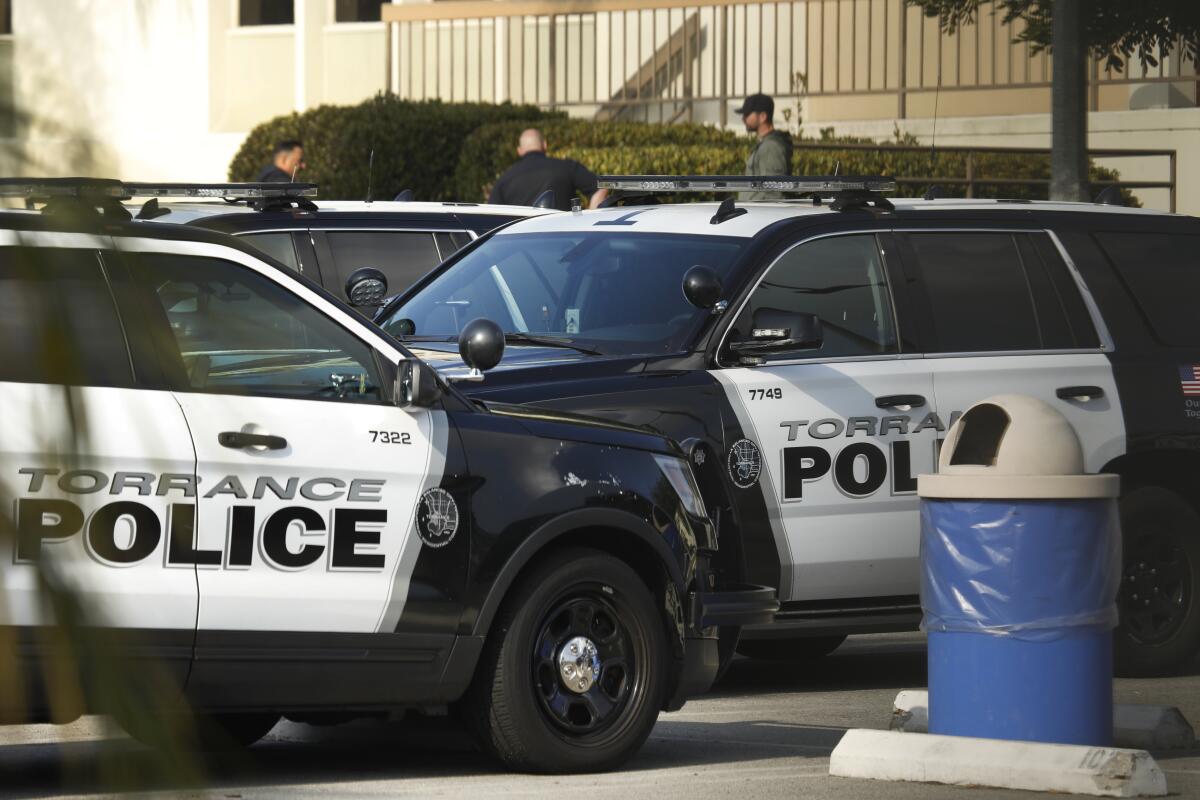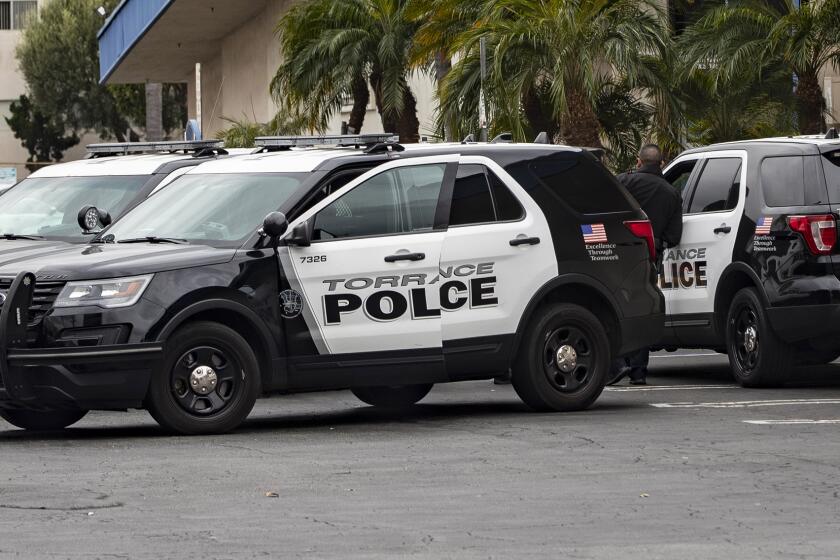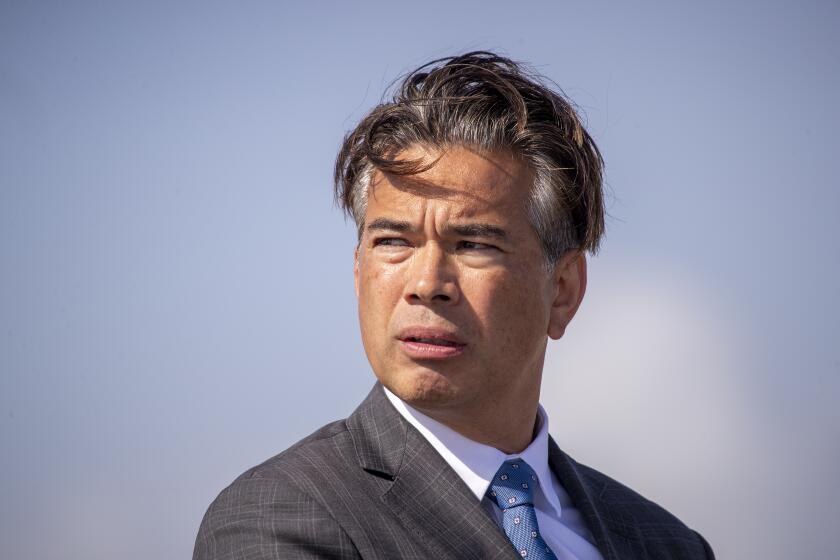Judge’s ruling limits what prosecutors can share about Torrance police text scandal

- Share via
A Los Angeles County Superior Court judge issued an order this week slowing the process by which prosecutors can disclose evidence of racist text messages and images sent by Torrance police officers embroiled in a scandal that could affect hundreds of criminal cases.
Prosecutors, who first uncovered evidence of the texts in July by obtaining a search warrant for the phones of ex-officers Cody Weldin and Christopher Tomsic, must now seek the approval of the judge who issued the warrant before disclosing any such information to defense attorneys, according to the ruling from Judge Kerry White.
White’s ruling came after attorneys for the officers asked the judge to suppress the texts as evidence in a criminal case charging Tomsic and Weldin with spray-painting a swastika inside a resident’s vehicle last year.
The move quickly drew criticism from both the Los Angeles County district attorney’s and public defender’s offices, who said White’s decision created an unnecessary hurdle for defendants who have a right to receive information that might impeach the testimony of police officers involved in their cases.
“This is an actual legal obligation that the prosecution has ... a court that prohibits the district attorney from doing his constitutional obligation is interfering with our client’s constitutional rights,” said L.A. County Public Defender Ricardo Garcia, who called White’s ruling “baffling.”
Prosecutors are required to provide defendants with any favorable evidence they gather, including information that could undermine the credibility of government witnesses, under a landmark 1963 U.S. Supreme Court decision, Brady vs. Maryland.
The Times has identified a dozen Torrance police officers who are under investigation for sharing racist and homophobic text messages and images.
It was unclear why White issued the broad order in a case focused on just two of the 13 officers under investigation in the scandal. Attempts to contact him Wednesday were unsuccessful. A court spokeswoman said judges are barred from commenting on active cases. A Torrance police spokesman declined to comment on the ruling.
A Times investigation published last week revealed the details of years of racist, antisemitic and homophobic text messages sent by more than a dozen current and former Torrance police officers and identified 13 officers under investigation for involvement in the scandal. The officers routinely used racial slurs to refer to Black people, joked about lynchings and using violence against suspects and, in one case, an officer suggested he had lied during an investigation of a fatal police shooting.
Fifteen Torrance police officers and one Long Beach officer have been placed on administrative leave or suspended as part of the scandal. Weldin and Tomsic left the department last year. California Atty. Gen. Rob Bonta also announced an investigation into the department last week.
The scandal has already led county and city prosecutors to dismiss roughly 90 criminal cases where the officers either made an arrest or would have served as a material witness, officials have said. The officers have been listed as potential witnesses in approximately 1,400 criminal cases in L.A. County, according to documents The Times obtained through a public records request.
Garcia said his office has received nearly 600 letters disclosing possible misconduct by the 13 officers identified in The Times article. Prosecutors obtained more than 200 gigabytes of data showing the racist texts date back to 2018, so Garcia expects prosecutors will have a lot more information to turn over, a process that he said would now be significantly stalled by White’s ruling.
“In the 26 years I have done this work, I have never seen anything like this,” Garcia said.
Garcia said attorneys in his office have only received letters containing quotations from the text messages or descriptions of images shared by the officers in the pretrial discovery process. Prosecutors have yet to turn over the raw conversations, a critical step that he said could also be slowed by White’s order.
California Atty. Gen. Rob Bonta announces an investigation into the Torrance Police Department after a Times report on racist texts between officers.
Alex Bastian, a special advisor to L.A. County Dist. Atty. George Gascón, said he believed White had “erred” in his ruling and that his office would explore possible legal remedies.
In the motion to suppress evidence against Tomsic and Weldin, who are charged with conspiracy and vandalism for allegedly spray-painting a swastika in a vehicle in January 2020, defense attorney Tom Yu argued the search was overly broad and “in no way tailored to any particular information that investigators were seeking from the alleged vandalism.”
Prosecutors sought the text messages when considering whether or not to file a hate crime allegation against the officers, which they have not done yet. A hearing on the suppression motion was scheduled for Monday in the Torrance courthouse, but was transferred to White’s courtroom, where he issued the order Tuesday.
Jonathan Abel, an expert on Brady material and associate professor at the UC Hastings law school in San Francisco, said the criminal prosecution of Tomsic and Weldin and the text messages related to the other officers raise distinct issues.
Evidence of racial bias against officers is commonly turned over as Brady material, and he expressed concern about how the ruling might delay defendants’ from getting access to information they have a legal right to review.
“Instead of the D.A. notifying the defense attorney, now they have to go through the judge and they have to get the judge to agree,” he said. “Now what happens if the judge agrees to disclose in one case, but not in the next case, and the D.A. thinks there should be disclosure in both cases?”
More to Read
Sign up for Essential California
The most important California stories and recommendations in your inbox every morning.
You may occasionally receive promotional content from the Los Angeles Times.













